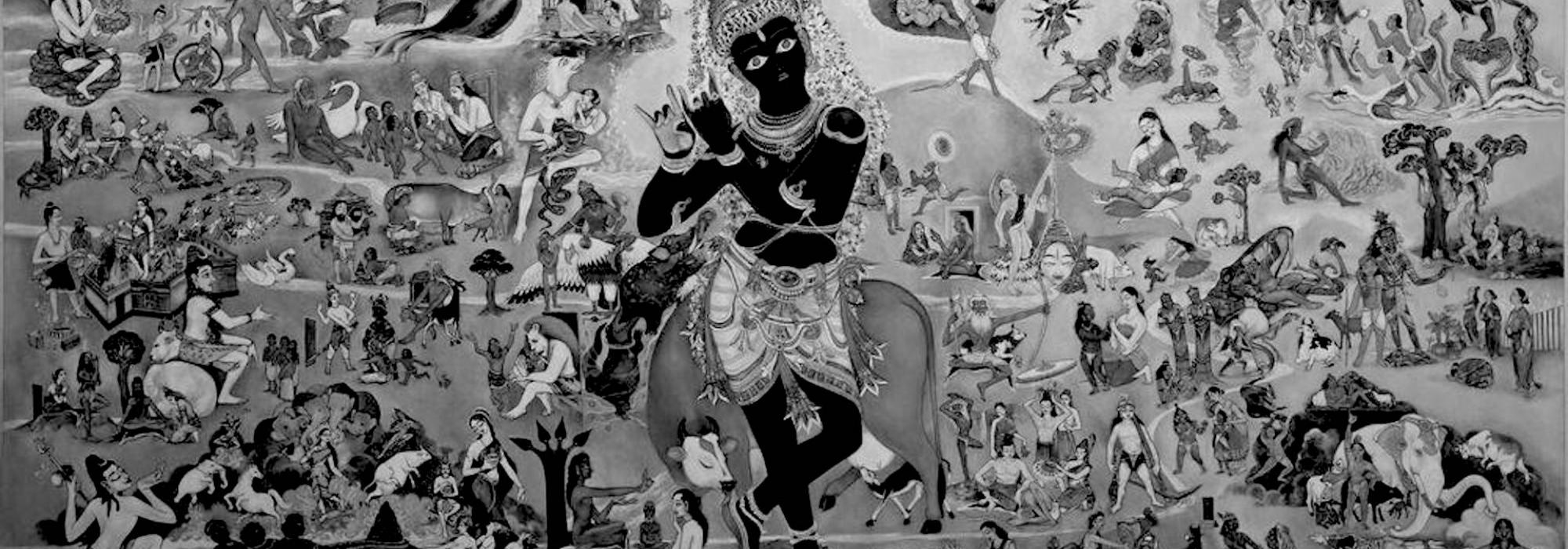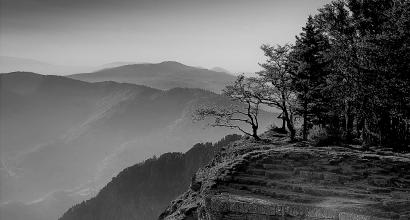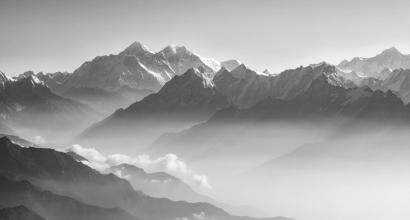“When devas are worshipped and satisfied, they give rain and good crops.”
It is easy to misconstrue this statement. Will rains cease, or will crops die because worship is stopped? Are rains and crops dependent on human effort? Then, does it not mean that man is more powerful than nature? This is a frivolous argument. If a father says to his scallywag of a son, “If you study well, I will buy you a wristwatch. If you listen to your mother she will give you tasty snacks,” what does it mean? Does he imply that he will not feed his son or throw him out of the house if he does not pass his exams? We are familiar with such behaviour of fathers and sons. Even if the son is a rogue and fails all his exams, his parents tell him to try, try, and try again. Bhagavān’s promises of rains and crops and fulfilment of other wishes are not injunctions, but incentives and means of encouragement. It is an instruction to an individual. Mother Nature does not stop rains and crops that are due to the whole world, just because an individual or a thousand people stop their worship and yajñas.
At this point, the symbiosis that is alluded to in “parasparaṃ bhāvayantaḥ” seems like it should be between humans and the divine. However, we should understand that a similar relationship with the motive of mutual benefit should be present between humans and lesser animals as well. It is also clear that humans should also have similar conduct with one another.
The statute of symbiosis is applicable to the whole world. What is its fundamental tenet?
sarva-bhūtastham-ātmānaṃ sarva-bhūtāni cātmani ।
īkṣate yoga-yuktātmā sarvatra sama-darśanaḥ ॥ BG 6.29
The inspiration for such conduct—a feeling of brotherhood—is natural in all beings. Goodness is present in everyone to at least a small extent, but it is hidden deep inside. It has to be brought out and made to express itself. That is the intention of śāstras and traditions.
Yajña is performed for the benefit of the entire world. It is a form of worship performed for the abnegation of one’s selfishness and the welfare of the world.
The universe thrives on the symbiosis between the devas and humans. Yajña is a means to establish that relationship. Such activity that cements the bond between the devas and humans is dharma. That is what the śruti says –
yajñena yajñam-ayajanta devāh | tāni dharmāṇi prathamāny-āsan || (Puruṣa-sūkta, Ṛgveda 10.90.16)
At the beginning of creation, various devas employed the five primordial elements (pañca-mahā-bhūtas) in appropriate activities, and thus worshipped Īśvara. That was the first yajña and the beginning of dharma. Dharma is the subservience of the forces of nature to the rule of the divine without transgressing it in any way. Dharma is performing acts that are ordained. This is what our great poets have praised. Vālmīki and Vyāsa are of the same opinion. They do not consider the devas to be completely separate from humans, or that there is no connection between their world and ours. Devas, humans and other animals belong to the same world.
yatra viśvam bhavatyekanīḍam॥ (Mahānārāyaṇa-Upaniṣad 1.14)
The entire universe is embedded in the nest of the Supreme Brahma. In the Śākuntala, Kālidāsa says,
tava bhavatu biḍaujāḥ prājyavṛṣṭiḥ prajāsu।
tvamapi vitatayajño vajriṇaṃ prīṇayasva ॥ (Abhijñāna-śākuntalam 7.34)
“May Indra send abundant rain for the benefit of your subjects; may you please him with many yajñas.”
We have to grasp the meaning of these lines of the Gītā (6-29) carefully. The universe is created by Īśvara. Many energies come together in this great and continuous endeavour. By the ordinance of Īśvara, man has the unique opportunity to collaborate with them, by becoming one of them. That is dharma. Satkarma is that which makes use of this opportunity.
Karma is like water, without its own form, taste or colour. Water takes the colour, taste, and form of the ground on which it flows. Similarly, depending on the person performing it, karma can be puṇya or pāpa. Karma that is beyond these may be a mere sport of ātmā. The nobler the karmi (doer) becomes, the purer the karma gets. Karma is, anyway, an integral part of the universe. When that is so, when it satisfies the governing deities of the universe, they grant good rain and bountiful crops in return. Living beings thus enjoy bliss and bounty.
There is a question here. What is the relation between yajña performed by humans and rains and crops? If men stopped performing yajña, would nature’s work cease? Does it not rain, don’t crops grow in countries where people do not even know the concept of yajña? Here are five points to ponder upon:
- All religions espouse the belief that there is a relationship between human merit and divine grace. Similarly, there is a relationship between human pāpa and the wrath of the deities. When they are angry, natural calamities such as drought, flood, earthquakes, and pandemics plague the earth. This belief can be observed in the texts of Islam as well as in Christian religion.
- Similarly, we cannot accept that in countries outside India - countries that do not know the Vedas and śāstras- rain and crops are obtained without yajña. Yajña is essentially the worship of the divine. In this broad sense, there is no community that does not perform yajña. Even the most primitive African tribe firmly believes in a supernatural power, fears its wrath, and craves for its blessing. Probably such faith is more entrenched in them than in modern city dwellers. There is no human without religion; and no religion without yajña. Therefore we cannot use the example of religions outside the umbrella of the Vedas to prove that there is no relationship between rain, crops, and yajña.
- Just as it is difficult to prove that human karma and nature are related, it is difficult to prove that they are unrelated. Similar are the claims about the afterlife and the otherworld. If rebirth is possible and the afterworld exists, puṇya and pāpa as well as drought and plenty are inter-related. “As in the physical world, so in the world of spirit, nothing ever goes without producing results – results of one kind or of another kind” [A line DVG probably made in English.] We believe in karma; we believe in rebirth; we believe that the future is influenced by the past. Therefore, we also believe that human karma is definitely related to divine intervention.
- If nature’s working is not a result of human actions, what can be the rationale for it? Does nature‘s activity proceed without any rules? Is it random? Is it mad exuberance? When we observe natural phenomena like the movements of the sun, moon, and earth, it does not seem so. We see order there. We have already seen that the warps of the thread of time find a place in the working of nature. Then, how do natural events sometimes occur without any apparent reason? Effect always has a cause. We reason that a part of those causes is human karma – good or bad. Nature follows the dicta of Īśvara. That karma should have appropriate consequences is Īśvara’s law.
- The universe is a glorious mega machine. Divine beings, humans, lesser animals, and inanimate objects are its gears, wheels, handles, ramrods, and ribbons. The machine works only if all these components are doing their allocated jobs. Suppose the screw on the mudguard of a car is loosened by coming into contact with a shaft, it should be repaired immediately. If it remains loose, it starts making a sound, the vibrations of which loosen other parts of the car. Gradually, the entire machinery of the car might fail. It is the same with the machinery of the universe. Transgression committed by a human today will touch the deities, the powers of nature and will anger them. Man is not isolated from the universal machine. Whatever happens to it, happens to him also. Whatever he does affects it as well. Thus, celestial beings and humans are parts of the same machine.
This has been explained in other places.
To be continued...
The present series is a modern English translation of DVG’s Kendra Sahitya Akademi Award-winning work, Bhagavad-gītā-tātparya or Jīvana-dharma-yoga. The translators wish to express their thanks to Śatāvadhāni R Ganesh for his valuable feedback and to Hari Ravikumar for his astute edits.











































